CIMA Report: The Changing Role of Management Accounting and Skills
VerifiedAdded on 2023/01/18
|8
|2145
|55
Report
AI Summary
This report provides a comprehensive analysis of the evolving role of management accounting within the business landscape, focusing on the skills required for success in this dynamic field. It begins with an introduction to the Chartered Institute of Management Accountants (CIMA) and then delves into the changing responsibilities of management accountants, highlighting the impact of technological advancements and the shift towards strategic advisory roles. The report examines the skills expected within the CIMA pillars (Enterprise, Performance, and Finance) and how these skills are applied at different CIMA levels, from the Certificate level to the Strategic level. It also explores the relevant literature that supports the changing role of management accounting and the need for continuous adaptation. The report concludes by summarizing the key takeaways and emphasizing the importance of these changes within the field of management accounting.
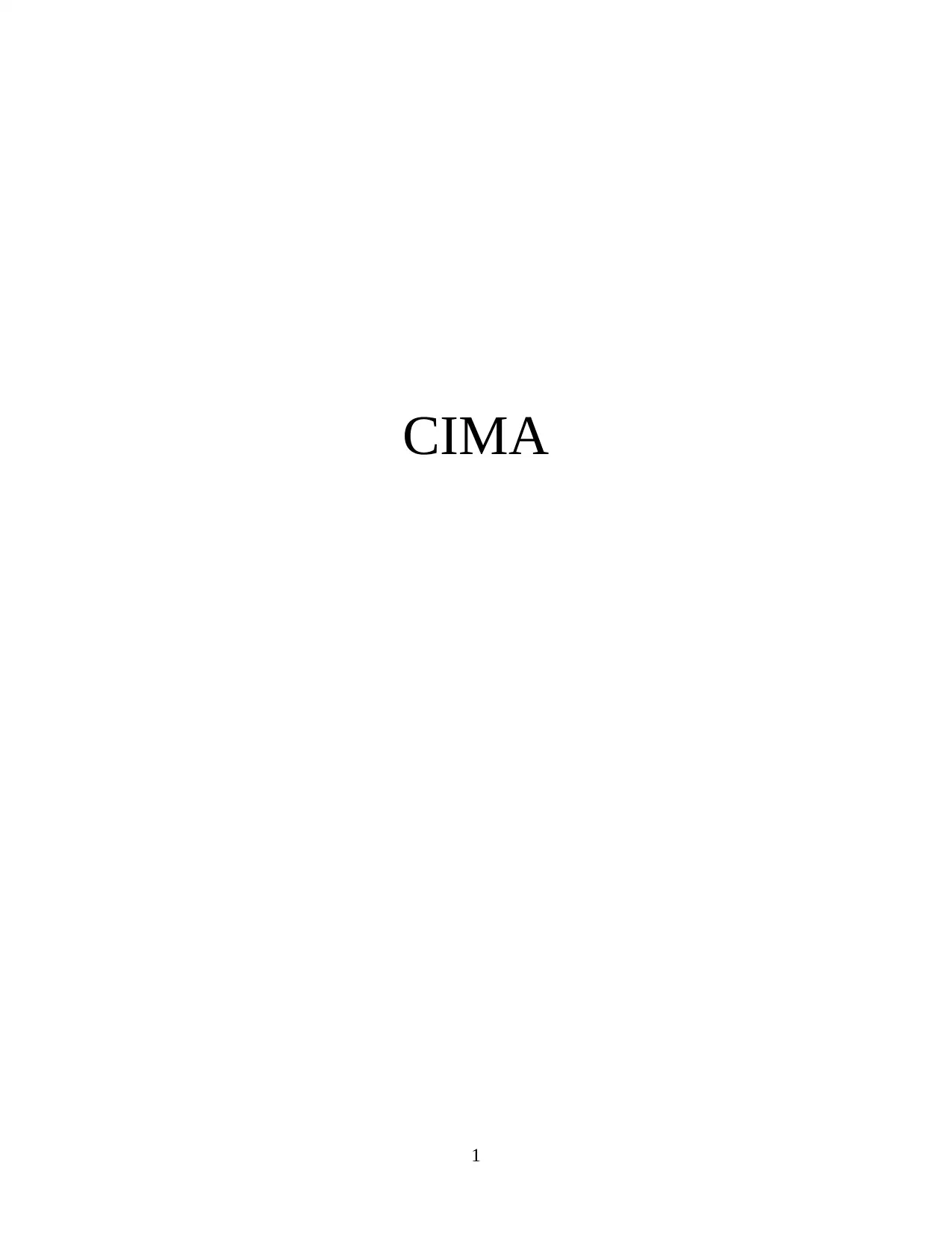
CIMA
1
1
Paraphrase This Document
Need a fresh take? Get an instant paraphrase of this document with our AI Paraphraser
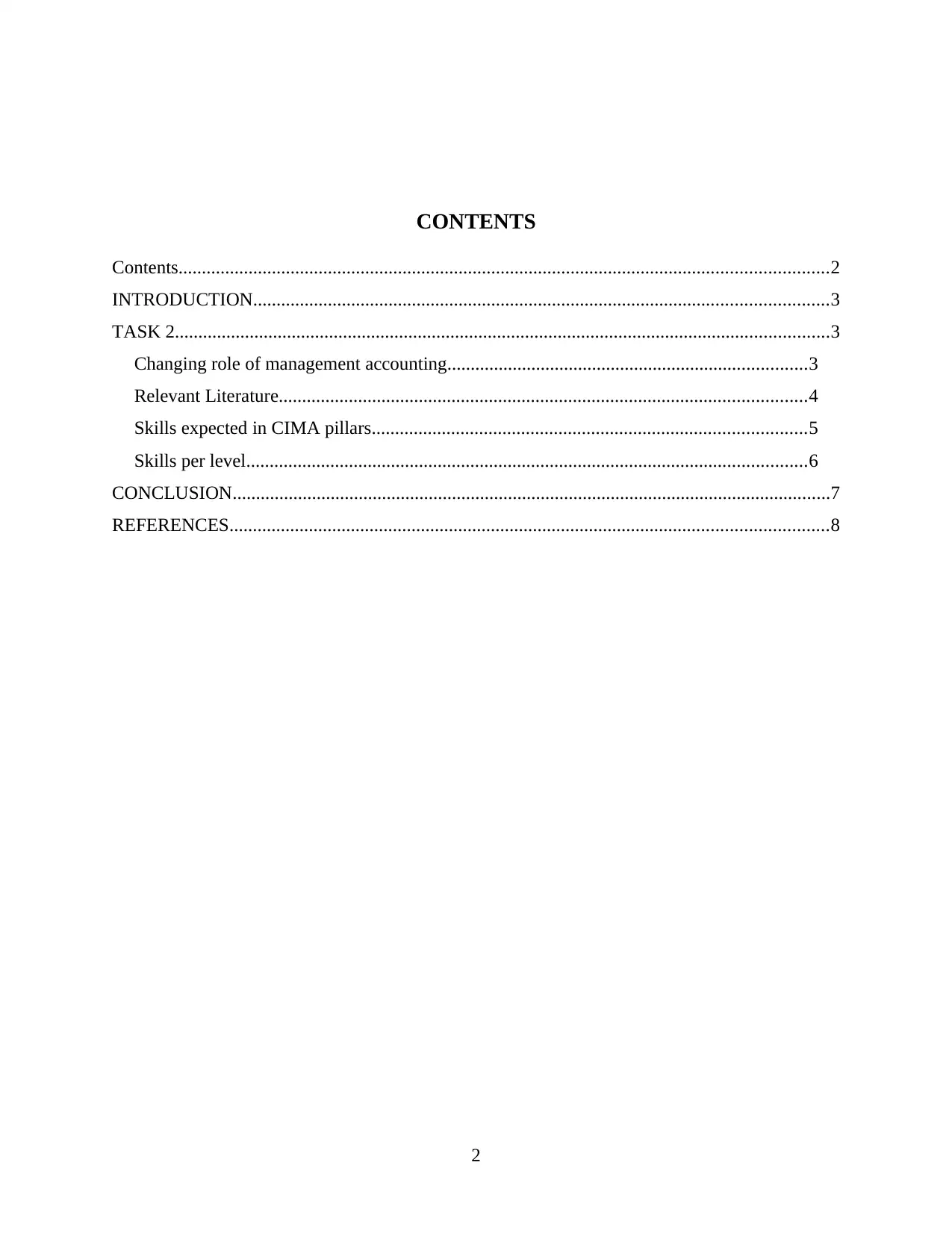
CONTENTS
Contents...........................................................................................................................................2
INTRODUCTION...........................................................................................................................3
TASK 2............................................................................................................................................3
Changing role of management accounting.............................................................................3
Relevant Literature.................................................................................................................4
Skills expected in CIMA pillars.............................................................................................5
Skills per level........................................................................................................................6
CONCLUSION................................................................................................................................7
REFERENCES................................................................................................................................8
2
Contents...........................................................................................................................................2
INTRODUCTION...........................................................................................................................3
TASK 2............................................................................................................................................3
Changing role of management accounting.............................................................................3
Relevant Literature.................................................................................................................4
Skills expected in CIMA pillars.............................................................................................5
Skills per level........................................................................................................................6
CONCLUSION................................................................................................................................7
REFERENCES................................................................................................................................8
2
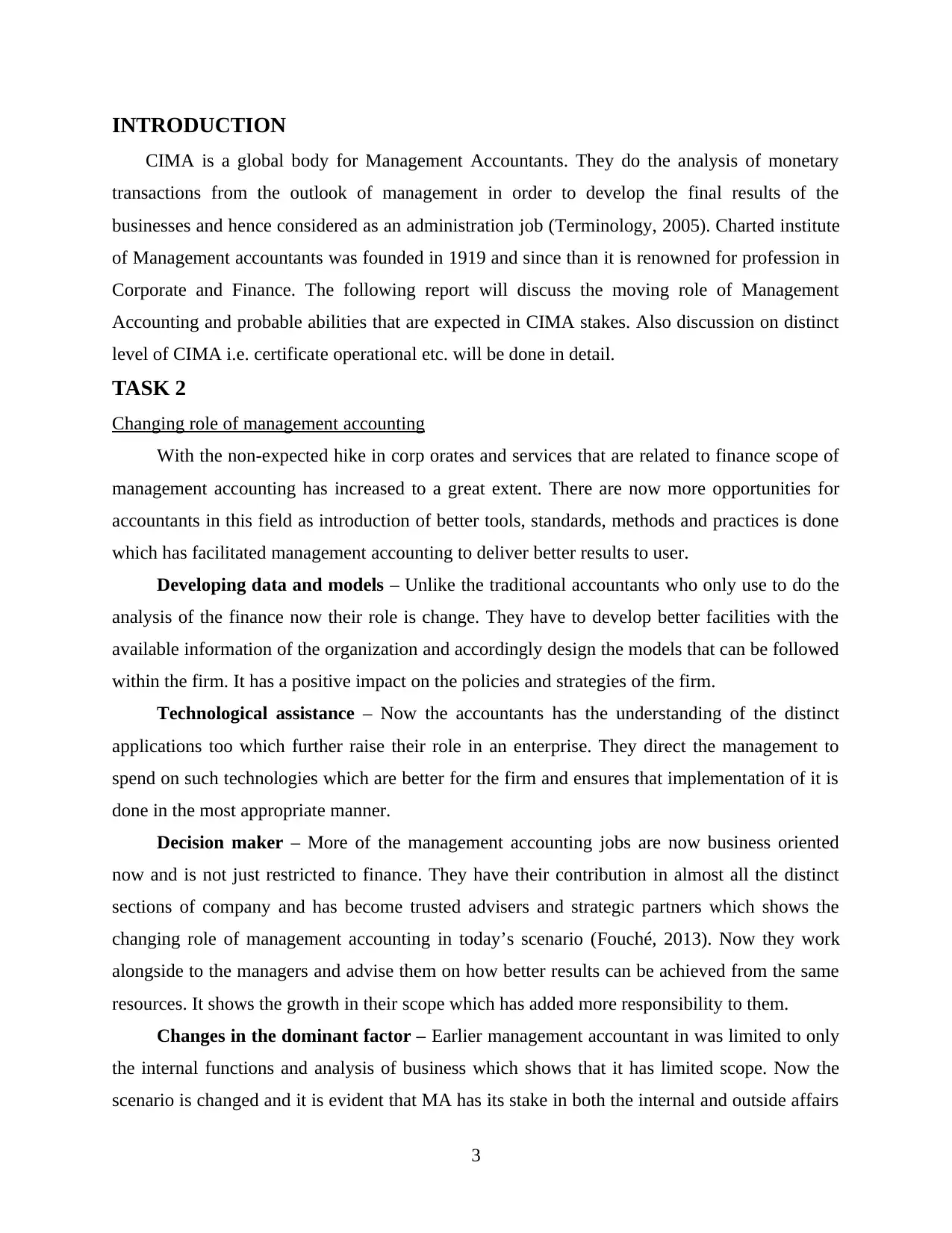
INTRODUCTION
CIMA is a global body for Management Accountants. They do the analysis of monetary
transactions from the outlook of management in order to develop the final results of the
businesses and hence considered as an administration job (Terminology, 2005). Charted institute
of Management accountants was founded in 1919 and since than it is renowned for profession in
Corporate and Finance. The following report will discuss the moving role of Management
Accounting and probable abilities that are expected in CIMA stakes. Also discussion on distinct
level of CIMA i.e. certificate operational etc. will be done in detail.
TASK 2
Changing role of management accounting
With the non-expected hike in corp orates and services that are related to finance scope of
management accounting has increased to a great extent. There are now more opportunities for
accountants in this field as introduction of better tools, standards, methods and practices is done
which has facilitated management accounting to deliver better results to user.
Developing data and models – Unlike the traditional accountants who only use to do the
analysis of the finance now their role is change. They have to develop better facilities with the
available information of the organization and accordingly design the models that can be followed
within the firm. It has a positive impact on the policies and strategies of the firm.
Technological assistance – Now the accountants has the understanding of the distinct
applications too which further raise their role in an enterprise. They direct the management to
spend on such technologies which are better for the firm and ensures that implementation of it is
done in the most appropriate manner.
Decision maker – More of the management accounting jobs are now business oriented
now and is not just restricted to finance. They have their contribution in almost all the distinct
sections of company and has become trusted advisers and strategic partners which shows the
changing role of management accounting in today’s scenario (Fouché, 2013). Now they work
alongside to the managers and advise them on how better results can be achieved from the same
resources. It shows the growth in their scope which has added more responsibility to them.
Changes in the dominant factor – Earlier management accountant in was limited to only
the internal functions and analysis of business which shows that it has limited scope. Now the
scenario is changed and it is evident that MA has its stake in both the internal and outside affairs
3
CIMA is a global body for Management Accountants. They do the analysis of monetary
transactions from the outlook of management in order to develop the final results of the
businesses and hence considered as an administration job (Terminology, 2005). Charted institute
of Management accountants was founded in 1919 and since than it is renowned for profession in
Corporate and Finance. The following report will discuss the moving role of Management
Accounting and probable abilities that are expected in CIMA stakes. Also discussion on distinct
level of CIMA i.e. certificate operational etc. will be done in detail.
TASK 2
Changing role of management accounting
With the non-expected hike in corp orates and services that are related to finance scope of
management accounting has increased to a great extent. There are now more opportunities for
accountants in this field as introduction of better tools, standards, methods and practices is done
which has facilitated management accounting to deliver better results to user.
Developing data and models – Unlike the traditional accountants who only use to do the
analysis of the finance now their role is change. They have to develop better facilities with the
available information of the organization and accordingly design the models that can be followed
within the firm. It has a positive impact on the policies and strategies of the firm.
Technological assistance – Now the accountants has the understanding of the distinct
applications too which further raise their role in an enterprise. They direct the management to
spend on such technologies which are better for the firm and ensures that implementation of it is
done in the most appropriate manner.
Decision maker – More of the management accounting jobs are now business oriented
now and is not just restricted to finance. They have their contribution in almost all the distinct
sections of company and has become trusted advisers and strategic partners which shows the
changing role of management accounting in today’s scenario (Fouché, 2013). Now they work
alongside to the managers and advise them on how better results can be achieved from the same
resources. It shows the growth in their scope which has added more responsibility to them.
Changes in the dominant factor – Earlier management accountant in was limited to only
the internal functions and analysis of business which shows that it has limited scope. Now the
scenario is changed and it is evident that MA has its stake in both the internal and outside affairs
3
⊘ This is a preview!⊘
Do you want full access?
Subscribe today to unlock all pages.

Trusted by 1+ million students worldwide
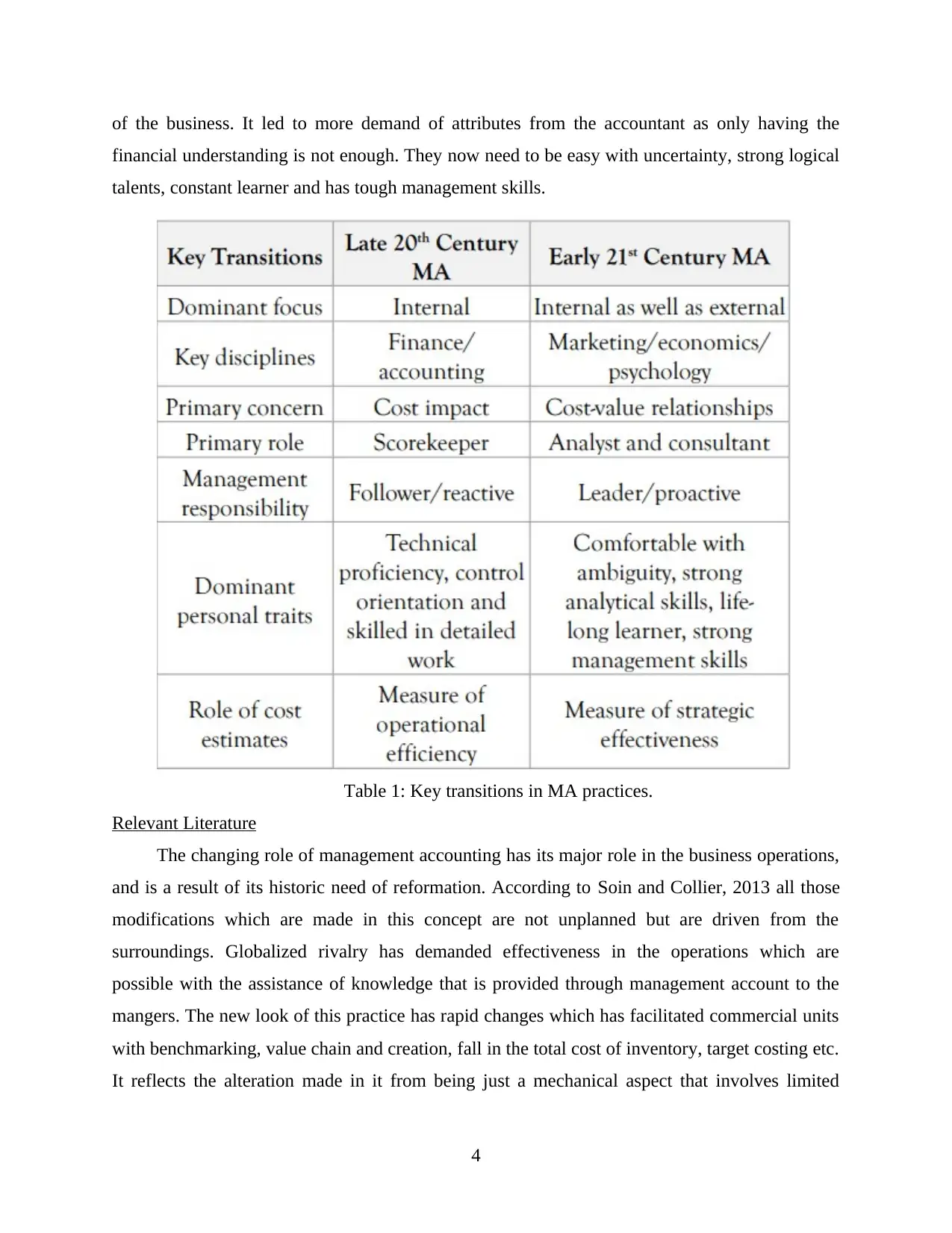
of the business. It led to more demand of attributes from the accountant as only having the
financial understanding is not enough. They now need to be easy with uncertainty, strong logical
talents, constant learner and has tough management skills.
Table 1: Key transitions in MA practices.
Relevant Literature
The changing role of management accounting has its major role in the business operations,
and is a result of its historic need of reformation. According to Soin and Collier, 2013 all those
modifications which are made in this concept are not unplanned but are driven from the
surroundings. Globalized rivalry has demanded effectiveness in the operations which are
possible with the assistance of knowledge that is provided through management account to the
mangers. The new look of this practice has rapid changes which has facilitated commercial units
with benchmarking, value chain and creation, fall in the total cost of inventory, target costing etc.
It reflects the alteration made in it from being just a mechanical aspect that involves limited
4
financial understanding is not enough. They now need to be easy with uncertainty, strong logical
talents, constant learner and has tough management skills.
Table 1: Key transitions in MA practices.
Relevant Literature
The changing role of management accounting has its major role in the business operations,
and is a result of its historic need of reformation. According to Soin and Collier, 2013 all those
modifications which are made in this concept are not unplanned but are driven from the
surroundings. Globalized rivalry has demanded effectiveness in the operations which are
possible with the assistance of knowledge that is provided through management account to the
mangers. The new look of this practice has rapid changes which has facilitated commercial units
with benchmarking, value chain and creation, fall in the total cost of inventory, target costing etc.
It reflects the alteration made in it from being just a mechanical aspect that involves limited
4
Paraphrase This Document
Need a fresh take? Get an instant paraphrase of this document with our AI Paraphraser
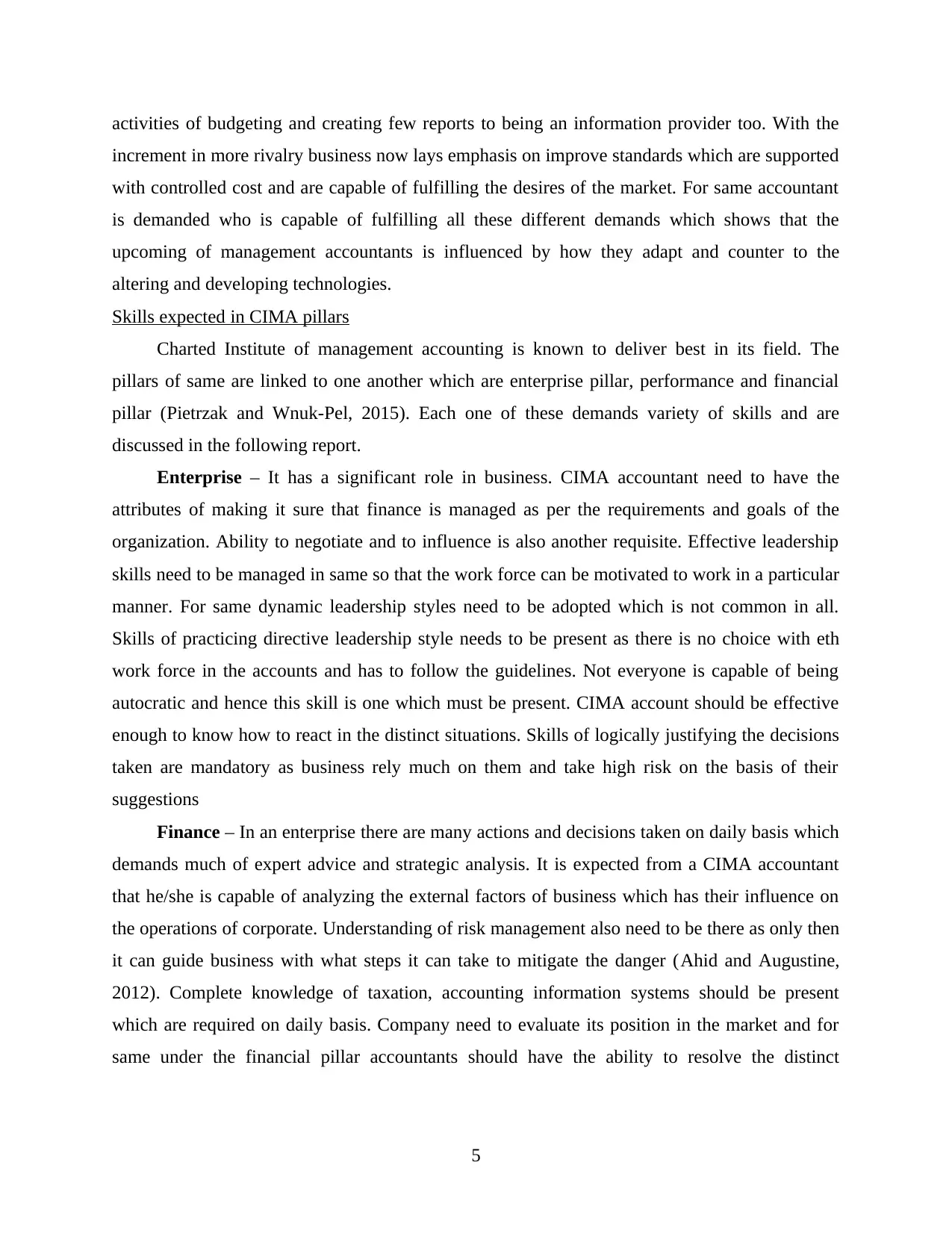
activities of budgeting and creating few reports to being an information provider too. With the
increment in more rivalry business now lays emphasis on improve standards which are supported
with controlled cost and are capable of fulfilling the desires of the market. For same accountant
is demanded who is capable of fulfilling all these different demands which shows that the
upcoming of management accountants is influenced by how they adapt and counter to the
altering and developing technologies.
Skills expected in CIMA pillars
Charted Institute of management accounting is known to deliver best in its field. The
pillars of same are linked to one another which are enterprise pillar, performance and financial
pillar (Pietrzak and Wnuk-Pel, 2015). Each one of these demands variety of skills and are
discussed in the following report.
Enterprise – It has a significant role in business. CIMA accountant need to have the
attributes of making it sure that finance is managed as per the requirements and goals of the
organization. Ability to negotiate and to influence is also another requisite. Effective leadership
skills need to be managed in same so that the work force can be motivated to work in a particular
manner. For same dynamic leadership styles need to be adopted which is not common in all.
Skills of practicing directive leadership style needs to be present as there is no choice with eth
work force in the accounts and has to follow the guidelines. Not everyone is capable of being
autocratic and hence this skill is one which must be present. CIMA account should be effective
enough to know how to react in the distinct situations. Skills of logically justifying the decisions
taken are mandatory as business rely much on them and take high risk on the basis of their
suggestions
Finance – In an enterprise there are many actions and decisions taken on daily basis which
demands much of expert advice and strategic analysis. It is expected from a CIMA accountant
that he/she is capable of analyzing the external factors of business which has their influence on
the operations of corporate. Understanding of risk management also need to be there as only then
it can guide business with what steps it can take to mitigate the danger (Ahid and Augustine,
2012). Complete knowledge of taxation, accounting information systems should be present
which are required on daily basis. Company need to evaluate its position in the market and for
same under the financial pillar accountants should have the ability to resolve the distinct
5
increment in more rivalry business now lays emphasis on improve standards which are supported
with controlled cost and are capable of fulfilling the desires of the market. For same accountant
is demanded who is capable of fulfilling all these different demands which shows that the
upcoming of management accountants is influenced by how they adapt and counter to the
altering and developing technologies.
Skills expected in CIMA pillars
Charted Institute of management accounting is known to deliver best in its field. The
pillars of same are linked to one another which are enterprise pillar, performance and financial
pillar (Pietrzak and Wnuk-Pel, 2015). Each one of these demands variety of skills and are
discussed in the following report.
Enterprise – It has a significant role in business. CIMA accountant need to have the
attributes of making it sure that finance is managed as per the requirements and goals of the
organization. Ability to negotiate and to influence is also another requisite. Effective leadership
skills need to be managed in same so that the work force can be motivated to work in a particular
manner. For same dynamic leadership styles need to be adopted which is not common in all.
Skills of practicing directive leadership style needs to be present as there is no choice with eth
work force in the accounts and has to follow the guidelines. Not everyone is capable of being
autocratic and hence this skill is one which must be present. CIMA account should be effective
enough to know how to react in the distinct situations. Skills of logically justifying the decisions
taken are mandatory as business rely much on them and take high risk on the basis of their
suggestions
Finance – In an enterprise there are many actions and decisions taken on daily basis which
demands much of expert advice and strategic analysis. It is expected from a CIMA accountant
that he/she is capable of analyzing the external factors of business which has their influence on
the operations of corporate. Understanding of risk management also need to be there as only then
it can guide business with what steps it can take to mitigate the danger (Ahid and Augustine,
2012). Complete knowledge of taxation, accounting information systems should be present
which are required on daily basis. Company need to evaluate its position in the market and for
same under the financial pillar accountants should have the ability to resolve the distinct
5
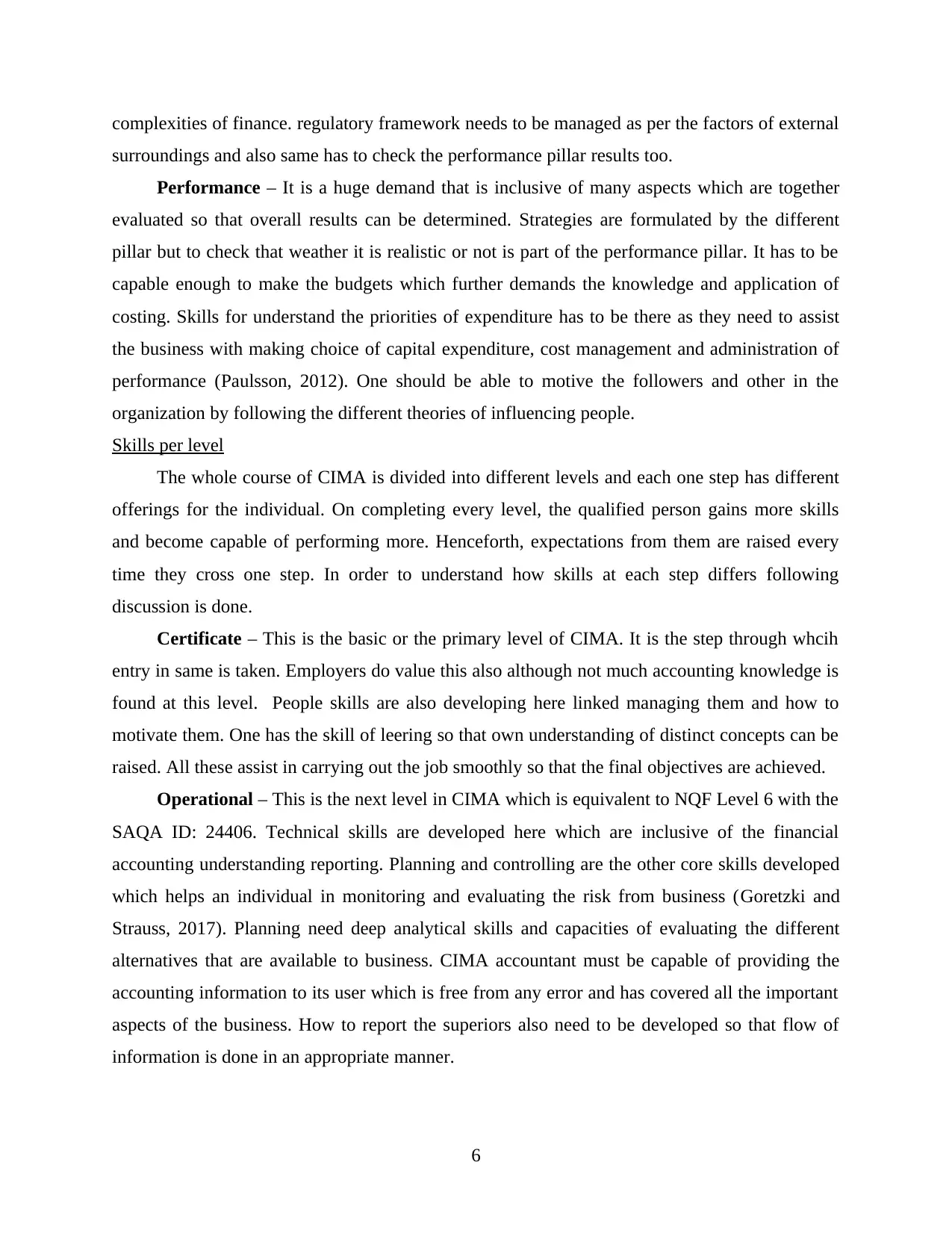
complexities of finance. regulatory framework needs to be managed as per the factors of external
surroundings and also same has to check the performance pillar results too.
Performance – It is a huge demand that is inclusive of many aspects which are together
evaluated so that overall results can be determined. Strategies are formulated by the different
pillar but to check that weather it is realistic or not is part of the performance pillar. It has to be
capable enough to make the budgets which further demands the knowledge and application of
costing. Skills for understand the priorities of expenditure has to be there as they need to assist
the business with making choice of capital expenditure, cost management and administration of
performance (Paulsson, 2012). One should be able to motive the followers and other in the
organization by following the different theories of influencing people.
Skills per level
The whole course of CIMA is divided into different levels and each one step has different
offerings for the individual. On completing every level, the qualified person gains more skills
and become capable of performing more. Henceforth, expectations from them are raised every
time they cross one step. In order to understand how skills at each step differs following
discussion is done.
Certificate – This is the basic or the primary level of CIMA. It is the step through whcih
entry in same is taken. Employers do value this also although not much accounting knowledge is
found at this level. People skills are also developing here linked managing them and how to
motivate them. One has the skill of leering so that own understanding of distinct concepts can be
raised. All these assist in carrying out the job smoothly so that the final objectives are achieved.
Operational – This is the next level in CIMA which is equivalent to NQF Level 6 with the
SAQA ID: 24406. Technical skills are developed here which are inclusive of the financial
accounting understanding reporting. Planning and controlling are the other core skills developed
which helps an individual in monitoring and evaluating the risk from business (Goretzki and
Strauss, 2017). Planning need deep analytical skills and capacities of evaluating the different
alternatives that are available to business. CIMA accountant must be capable of providing the
accounting information to its user which is free from any error and has covered all the important
aspects of the business. How to report the superiors also need to be developed so that flow of
information is done in an appropriate manner.
6
surroundings and also same has to check the performance pillar results too.
Performance – It is a huge demand that is inclusive of many aspects which are together
evaluated so that overall results can be determined. Strategies are formulated by the different
pillar but to check that weather it is realistic or not is part of the performance pillar. It has to be
capable enough to make the budgets which further demands the knowledge and application of
costing. Skills for understand the priorities of expenditure has to be there as they need to assist
the business with making choice of capital expenditure, cost management and administration of
performance (Paulsson, 2012). One should be able to motive the followers and other in the
organization by following the different theories of influencing people.
Skills per level
The whole course of CIMA is divided into different levels and each one step has different
offerings for the individual. On completing every level, the qualified person gains more skills
and become capable of performing more. Henceforth, expectations from them are raised every
time they cross one step. In order to understand how skills at each step differs following
discussion is done.
Certificate – This is the basic or the primary level of CIMA. It is the step through whcih
entry in same is taken. Employers do value this also although not much accounting knowledge is
found at this level. People skills are also developing here linked managing them and how to
motivate them. One has the skill of leering so that own understanding of distinct concepts can be
raised. All these assist in carrying out the job smoothly so that the final objectives are achieved.
Operational – This is the next level in CIMA which is equivalent to NQF Level 6 with the
SAQA ID: 24406. Technical skills are developed here which are inclusive of the financial
accounting understanding reporting. Planning and controlling are the other core skills developed
which helps an individual in monitoring and evaluating the risk from business (Goretzki and
Strauss, 2017). Planning need deep analytical skills and capacities of evaluating the different
alternatives that are available to business. CIMA accountant must be capable of providing the
accounting information to its user which is free from any error and has covered all the important
aspects of the business. How to report the superiors also need to be developed so that flow of
information is done in an appropriate manner.
6
⊘ This is a preview!⊘
Do you want full access?
Subscribe today to unlock all pages.

Trusted by 1+ million students worldwide
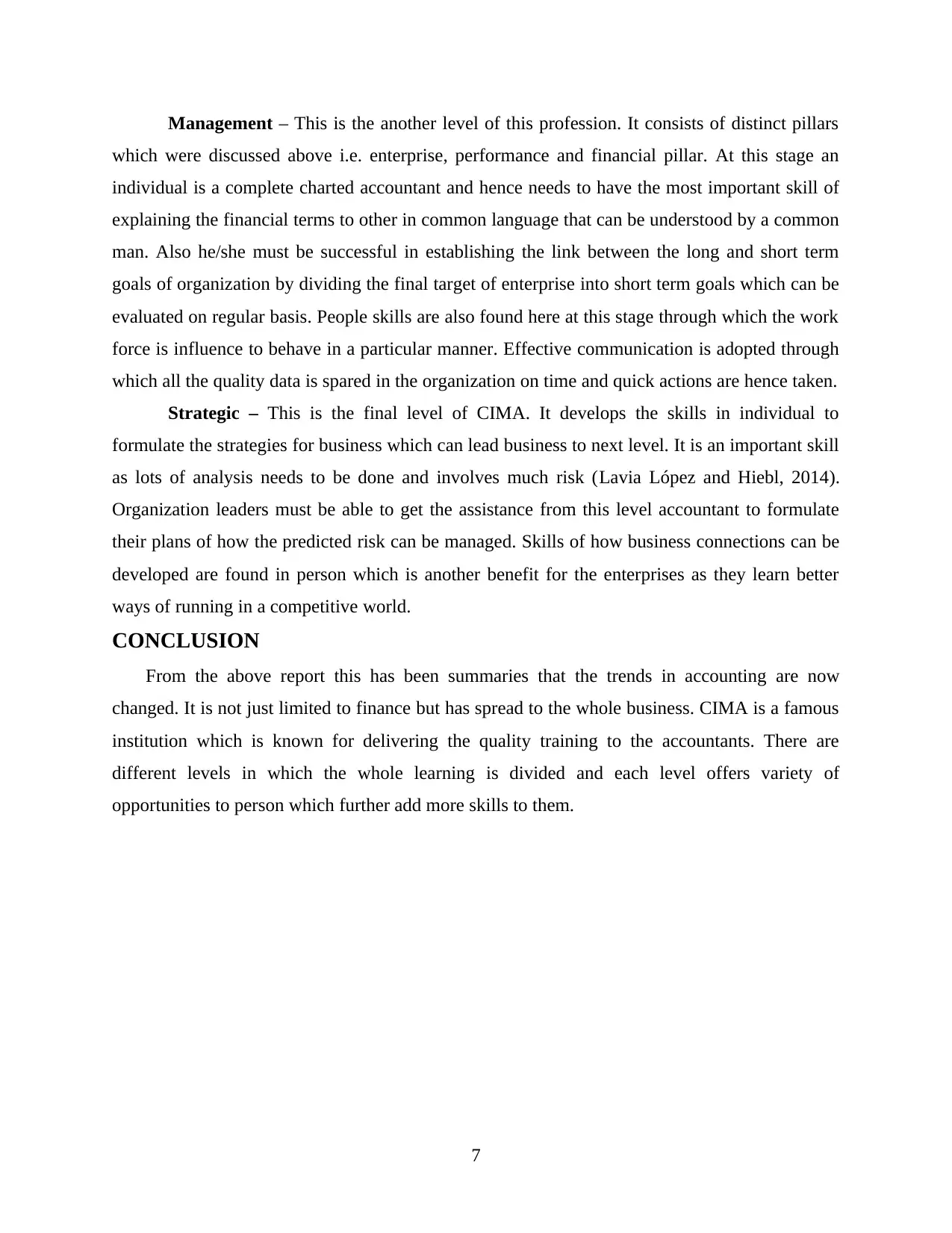
Management – This is the another level of this profession. It consists of distinct pillars
which were discussed above i.e. enterprise, performance and financial pillar. At this stage an
individual is a complete charted accountant and hence needs to have the most important skill of
explaining the financial terms to other in common language that can be understood by a common
man. Also he/she must be successful in establishing the link between the long and short term
goals of organization by dividing the final target of enterprise into short term goals which can be
evaluated on regular basis. People skills are also found here at this stage through which the work
force is influence to behave in a particular manner. Effective communication is adopted through
which all the quality data is spared in the organization on time and quick actions are hence taken.
Strategic – This is the final level of CIMA. It develops the skills in individual to
formulate the strategies for business which can lead business to next level. It is an important skill
as lots of analysis needs to be done and involves much risk (Lavia López and Hiebl, 2014).
Organization leaders must be able to get the assistance from this level accountant to formulate
their plans of how the predicted risk can be managed. Skills of how business connections can be
developed are found in person which is another benefit for the enterprises as they learn better
ways of running in a competitive world.
CONCLUSION
From the above report this has been summaries that the trends in accounting are now
changed. It is not just limited to finance but has spread to the whole business. CIMA is a famous
institution which is known for delivering the quality training to the accountants. There are
different levels in which the whole learning is divided and each level offers variety of
opportunities to person which further add more skills to them.
7
which were discussed above i.e. enterprise, performance and financial pillar. At this stage an
individual is a complete charted accountant and hence needs to have the most important skill of
explaining the financial terms to other in common language that can be understood by a common
man. Also he/she must be successful in establishing the link between the long and short term
goals of organization by dividing the final target of enterprise into short term goals which can be
evaluated on regular basis. People skills are also found here at this stage through which the work
force is influence to behave in a particular manner. Effective communication is adopted through
which all the quality data is spared in the organization on time and quick actions are hence taken.
Strategic – This is the final level of CIMA. It develops the skills in individual to
formulate the strategies for business which can lead business to next level. It is an important skill
as lots of analysis needs to be done and involves much risk (Lavia López and Hiebl, 2014).
Organization leaders must be able to get the assistance from this level accountant to formulate
their plans of how the predicted risk can be managed. Skills of how business connections can be
developed are found in person which is another benefit for the enterprises as they learn better
ways of running in a competitive world.
CONCLUSION
From the above report this has been summaries that the trends in accounting are now
changed. It is not just limited to finance but has spread to the whole business. CIMA is a famous
institution which is known for delivering the quality training to the accountants. There are
different levels in which the whole learning is divided and each level offers variety of
opportunities to person which further add more skills to them.
7
Paraphrase This Document
Need a fresh take? Get an instant paraphrase of this document with our AI Paraphraser
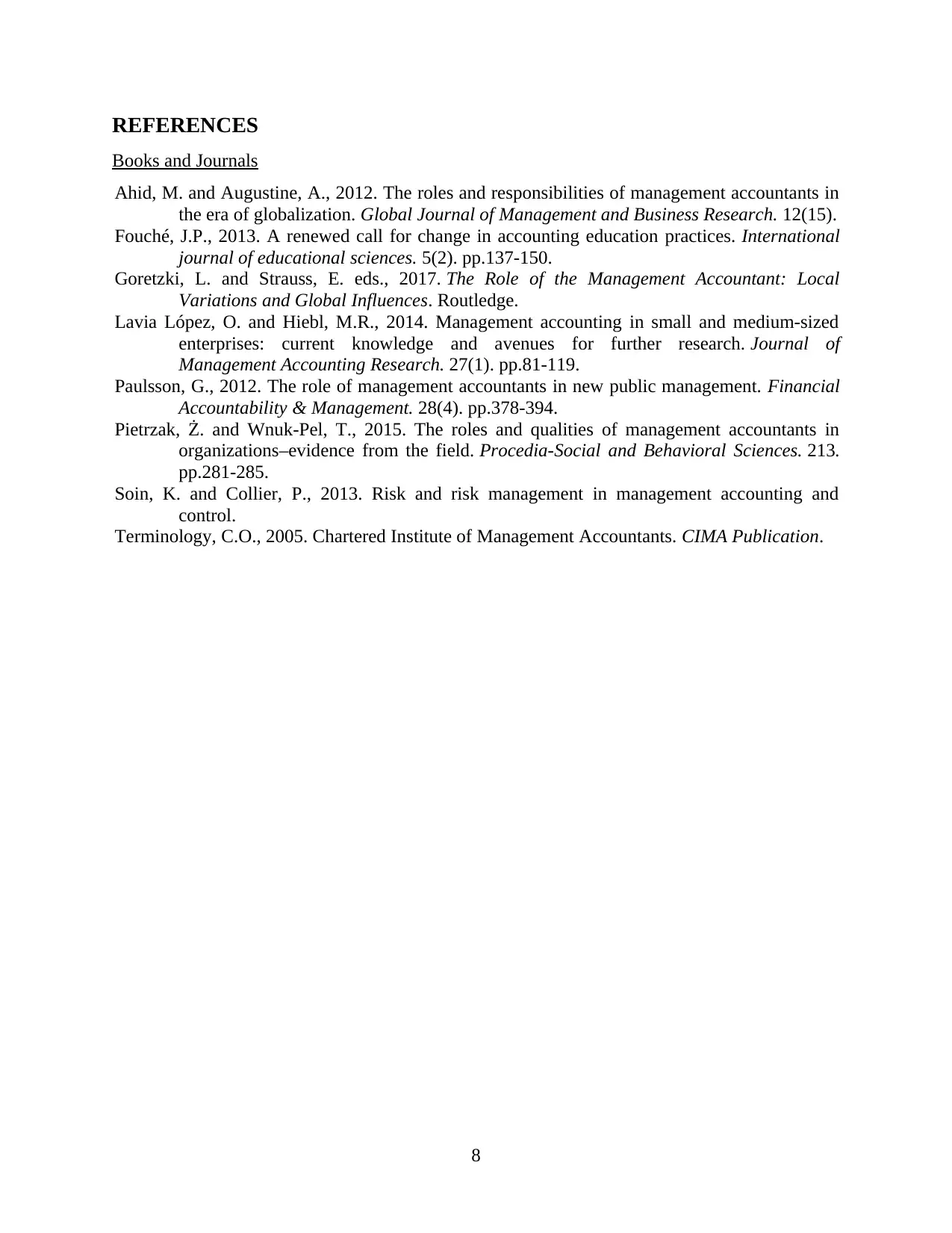
REFERENCES
Books and Journals
Ahid, M. and Augustine, A., 2012. The roles and responsibilities of management accountants in
the era of globalization. Global Journal of Management and Business Research. 12(15).
Fouché, J.P., 2013. A renewed call for change in accounting education practices. International
journal of educational sciences. 5(2). pp.137-150.
Goretzki, L. and Strauss, E. eds., 2017. The Role of the Management Accountant: Local
Variations and Global Influences. Routledge.
Lavia López, O. and Hiebl, M.R., 2014. Management accounting in small and medium-sized
enterprises: current knowledge and avenues for further research. Journal of
Management Accounting Research. 27(1). pp.81-119.
Paulsson, G., 2012. The role of management accountants in new public management. Financial
Accountability & Management. 28(4). pp.378-394.
Pietrzak, Ż. and Wnuk-Pel, T., 2015. The roles and qualities of management accountants in
organizations–evidence from the field. Procedia-Social and Behavioral Sciences. 213.
pp.281-285.
Soin, K. and Collier, P., 2013. Risk and risk management in management accounting and
control.
Terminology, C.O., 2005. Chartered Institute of Management Accountants. CIMA Publication.
8
Books and Journals
Ahid, M. and Augustine, A., 2012. The roles and responsibilities of management accountants in
the era of globalization. Global Journal of Management and Business Research. 12(15).
Fouché, J.P., 2013. A renewed call for change in accounting education practices. International
journal of educational sciences. 5(2). pp.137-150.
Goretzki, L. and Strauss, E. eds., 2017. The Role of the Management Accountant: Local
Variations and Global Influences. Routledge.
Lavia López, O. and Hiebl, M.R., 2014. Management accounting in small and medium-sized
enterprises: current knowledge and avenues for further research. Journal of
Management Accounting Research. 27(1). pp.81-119.
Paulsson, G., 2012. The role of management accountants in new public management. Financial
Accountability & Management. 28(4). pp.378-394.
Pietrzak, Ż. and Wnuk-Pel, T., 2015. The roles and qualities of management accountants in
organizations–evidence from the field. Procedia-Social and Behavioral Sciences. 213.
pp.281-285.
Soin, K. and Collier, P., 2013. Risk and risk management in management accounting and
control.
Terminology, C.O., 2005. Chartered Institute of Management Accountants. CIMA Publication.
8
1 out of 8
Related Documents
Your All-in-One AI-Powered Toolkit for Academic Success.
+13062052269
info@desklib.com
Available 24*7 on WhatsApp / Email
![[object Object]](/_next/static/media/star-bottom.7253800d.svg)
Unlock your academic potential
Copyright © 2020–2026 A2Z Services. All Rights Reserved. Developed and managed by ZUCOL.





